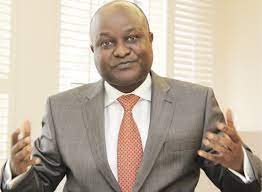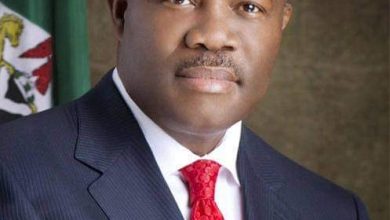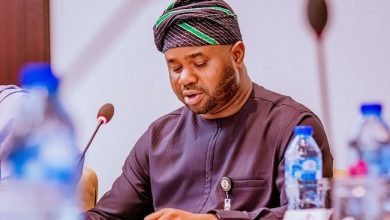CAN TITAN BANK WAKE UP THE SLUMBERING UNION BANK ?

Titan Trust Bank Takes Over Union Bank, Nigeria’s Second Oldest Bank
The takeover of Union Bank by Titan Bank this week has continued to generate mixed feelings across the country and among the financial analysts . To some ,it is long overdue for a bank that has failed to live up to the expectations of its stakeholders ; to some , it is an opportunity to do away with the current management for its ininspiring and non- performance.However , some are still skeptical over the new owner’s ability to wake up the sleeping giant due to lack of track record that could be traced to it in the financial industry .
On Wednesday , the Board of Union Bank of Nigeria Plc (Union Bank) notified the NGX and Securities Exchange Commission that its investors Union Global Partners Limited, Atlas Mara Limited and other shareholders have reached an agreement with Titan Trust Bank Limited (TTB) to divest their shareholding in Union Bank to TTB. The agreement, which is subject to regulatory approvals and other financial conditions, will upon completion transfer 89.39% of Union Bank’s issued share capital to TTB.
Commenting on the transaction: Chair, Union Bank, Mrs. Beatrice Hamza Bassey said: “On behalf of the Board, we congratulate all the parties involved in reaching this phase of the transaction and the Board looks forward to supporting the next steps to ensure a seamless completion of the process following regulatory approvals.
We are grateful to our current investors whose significant and consequential investments over the past nine years facilitated the transformation of Union Bank, one of Nigeria’s oldest and storied institutions. Today, the Bank is well-positioned with an innovative product offering, a growing customer base of over six million and consistent year on year profitability. This is a solid foundation for our incoming investors to build on as we move into a new era for the Bank”.
Chair, Titan Trust Bank, Mr. Tunde Lemo, OFR said: The Board of Titan Trust Bank and our key stakeholders are delighted as this transaction marks a key step for Titan Trust in its strategic growth journey and propels the institution to the next level in the Nigerian banking sector.The deal represents a unique opportunity to combine Union Bank’s longstanding and leading banking franchise with TTB’s innovation-led model which promises to enhance the product and service offering for our combined valued customers”.
Chief Executive Officer, Union Bank, Mr. Emeka Okonkwo said: “This transaction marks a significant milestone in the journey of our 104-year old Bank. Whilst thanking our current investors for their unwavering commitment to the Bank over the years, we welcome our new core investor, TTB. We recognize the strategic fit between the two institutions and expect that this deal will deliver the best outcome for our employees, customers and stakeholders. We look forward to collectively writing the next exciting chapter for Union Bank”.
Chief Executive Officer, Titan Trust Bank, Mr. Mudassir Amray said:
“After completing over two years of operations with aggressive organic growth, we are excited to have an opportunity for a significant leap forward in market share. UBN’s widespread presence, state-of-the-art technology platform, quality staff and strong brand loyalty fits well with our synchronized modular strategy. We look forward to delivering superior results for the benefit of our staff, customers, shareholders, and stakeholders”.Rothschild & Cie acted as financial adviser and White & Case LLP and Banwo & Ighodalo acted as legal advisers respectively, to the selling shareholders of Union Bank.Citigroup Global Markets Limited acted as financial adviser, Pricewaterhouse Coopers as due diligence partner, Norton Rose Fulbright LLP, Drew Law Practise and G. Elias & Co. acted as legal advisers respectively to TTB.
CAN TITAN BANK WAKE UP THE SLUMBERING UNION BANK ?
At an event held on Saturday, April 1st, 2017, at the Lagos Oriental Hotel, Lekki, Lagos, Union Bank, tagged one of Nigeria’s most-respected financial institutions by the organizer , emerged winner in the Best Rebranding category at the same event .The award was a recognition of the Bank’s new brand identity unveiled in October 2015 by the management .It had previously won two international Gold awards at the Transform Awards MENA 2016 for ‘Best Brand Development to Reflect Changed Mission / Vision / Positioning’ and ‘Best Visual Identity from the Financial Services Sector’.
While above efforts are not uncommon in the corporate world ,Union Bank is still very much in slumber . The foundations of the past had been shaken and fractured as the industrial terrain changed shape faster than the top management could refashion its basic beliefs and assumptions. When the above become inescapable its new executives only picked up the knife and began the brutal work of restructuring. The goal was to carve away layers of corporate fat ,jettison under performing businesses and raise the asset productivity ; the bank was drafted to an emergency room for surgery . Moreover ,in order to reposition the bank tried hard to locate new or appropriate markets to serve , technologies to master , customers to serve and how to get the best out of employees but these efforts yielded less impressive results . But these efforts only resulted in incremental profits while the bank continues to battle with the problems of stagnant growth, declining margins and falling market share .
Although the new management that took over rebranded the bank , till now it is yet to generate commensurable values and its shareholders are mostly at the receiving end ; this is going by its roller coaster of lethargic performance in the last few years. With the release of the full year result for 2020 , the red ink blotting the progress of Union Bank PLC was dabbed off leaving only promises of a perpetual stay within the black lines of profitability . It is with this level of expectations that investors and indeed the financial world waited to see UBN’s result for 2021 . But the bank disappointed them with uninspiring results from the first Quarter, 2021. .Also , practically all other performance metrics looked down in the third quarter of the year except the gross earnings that increased marginally . Its Q3 2021 -audited results for the period ended September 30th, 2021 show its gross earnings grew merely by 1.4% to N123bn from N121bn in the previous quarter , profit before tax declined by 8% to N14.2bn.while profit after tax declined by 11% to N13.4b .
But the above does not even depict its real and comprehensive picture of the bank in the third quarter of 2021 .A detailed analysis of the bank book revealed a dangerous slide on. its fortunes . The figures of its profitability shown above are incomplete without the total comprehensive income .The bank subsequently ended Q3 with N7.6 billion or 55.5 percent drop against N17.1 billion in the corresponding period of 2020 .This was due to a gross expense of N3.1billion sustained from its discontinued operations as against N1.9 billion income from it and a N6.2 billion loss from financial assets in the other comprehensive segment of its profit and loss account ..Against this total comprehensive income , the bank ordinarily would have recorded N15.4 billion as its profit for Q3 ,2021 , little less than N15.8 billion registered last year , if not for the injuries in the discontinued and other comprehensive income segments .Though its earnings have grown by 13.3% per year over the past 5 years , however , it has had negative earnings growth of -1.3% over the past year compared to the sector’s or industry average of 10.5%
.INEFFICIENCY AS THE MAJOR HEADACHE
The source of worry is its inefficiency and the management is allegedly the major culprit . Size has nothing with efficiency .This is a hard fact ; just as bigness without stretch and leverage is obesity, smallness without stretch and leverage is impotence . The argument is that there are so many examples of companies that even overcame seemingly insuperable resource handicaps and built positions of global leadership with sound management in place
.OUTRAGEOUS COST TO INCOME RATIOS
Since Union Bank was taken over from the old management whose managerial malfeasance threw the bank into distress mode, it has not been the same again . A proof to justify this allegation is the management obvious inability to control costs A major riddle yet to be resolved by Union Bank could be situated in its operating activities where it has not been able to either boost revenues high enough or douse the fire from its operating costs hitting the roof top in the last few years . In Q3 ,2021, the bank’s operating income inched up 2 percent to N71.2 b from N69.5b , its Net impairment write-back on other financial assets grew by 11percent to N340m from N306m and the bank’s operating Expenses increased by 3.3% YoY to N55.3b from N53.6b reflecting higher non- discretionary regulatory costs as well as depreciation and amortization costs from technology spent .However , this scenario above may be deceptive . The bank’s Cost to income Ratio (CIR) increased by 50bps from 77.1% in 9M 2020 to 77.6% in 9M 2021 This is where the bank slaughters its fortunes and terminates the hope on its much needed efficiency . In a layman’s term it indicates the bank is converting only 23 kobo to profit from every N1.00 made as revenue . This is a tradition not accidental . Cost-to-income ratio is the measure of the costs of running a company in relation to its operating income. The higher the ratio, the greater the risk of zero profitability. Between 2015 and 2019 it ranged from70.70%,66.20% ,63.00%,82.90% to 74.10% while its three and five years averages were 73.33% and 71.38%
But the reason for this is clear .: when a leadership too often assumes that competition is limited to market share with little attention to competition for foresight, competition to build competencies, and competition to shape industry evolution , the drive for industry leadership is sacrificed . To avert such a disaster a proactive leader often engages in both extra-market, or non-market and market competitions . This is no doubt the managerial lacuna expected to be filled if any sound management is put in place to move Union Bank forward
WHEN SHAREHOLDERS ARE AT THE RECEIVING END
From every indication , the problem with Union Bank allegedly is lack a capable hand or strategic leadership to efficiently turn it around and its shareholders are at the receiving end. Banks have five constituencies to serve and from these constituencies one can decipher its performance and health. These include the community at large which expects to be good corporate citizen surplus units from which it borrows, deficit units which borrow it and the regulatory authorities who interest is to ensure that the bank does not take excessive risks , For all these , Union Bank performance does not raise any eyebrow . However , it is for the fifth constituency , the shareholders , which requires adequate or maximum returns on their investments in order to remain invested in the bank and to be willing to continue to provide additional resources as and when need , that its performance is miserable .This comes clearly from the perspectives as its profit margins , returns on equity and assets , dividend yields ,earning per share and market values . These are all rendered less impressive and less competitive by the bank’s outrageous costs and its risk management.
WEAK ROAE
Return on average equity (ROAE) is a financial ratio that measures the performance of a company based on its average shareholders’ equity outstanding ; its Return on Average Equity, ROAE, declined by 0.6 percent to 8.2% in Q3 ,2021 compared 8.8% in December 2020 ; this is very low making less than N10 for its shareholders from every N100 worth equity employed and a reflection of its weak profitability ; ROE is a measure of the profitability of the firm and helps investors gauge how their investments are generating income .Between 2015 and 2019 its ROAE ranged6.03% ,5.94% , 4.23% ,6.24% and 10.20% .However its three and five years averages were 6.89% and 6.53% respectively
.ROA TOO
This ratio is modest but for any observer in the field of finance .It ranged between ,1.35% 1.34%,1.08%,1.26%,and 1.30% from2015 to 2019.However ,this was not because of better use of its but the massive clean up of its books in those years .Though the bank clean up still continues, the pace has slowed down and its returns on assets are not that impressive as in those years of massive asset cuttings . Its Return on Assets ,ROA , follows the same trend as its ROE in 2021 highlighted above ; it was down by 0.2% to 0.9% to 1.1% in the period under review This is very low and a percentage return on assets like this indicates that the company is not making enough income from the use of its assets making less than one kobo from every one naira assets put to work . A situation like this t may indicate an unwise investment on the part of management , inefficient use of company assets or a problem with its strategic management In other words, the company receives less than one percent return or less one naira on every N100 it invests in assets
EARNING PER SHARE AND PROFIT MARGINS.
This weak earnings affected its profitability and also manifests in its Earnings per share and net profit margins ; .it recorded 53 kobo compared to 54 kobo a year ago per share .The bank EPS were 0.49,0.53,0.45,0.61and 0.84between 2015 and 2019 respectively .However , its three and five years averages were 0.63 and 0.58 . . The figures serve as indicators of a company’s profitability.
NET PROFIT MARGIN
Its net tax margins 12.5 and 13 percent between the two periods Net profit margin is the ratio of net profits to revenue for a company. The net profit margin illustrates how much of each naira in revenue collected by a company translates into profit. Between 2015 and 2019 its net profit =margins were 12.13% 12.16% ,7.94%, 12.72% and 15.24%
RIDICULOUS DIVIDEND YIELDS AND PAYOUT
In the light of the above analysis its dividend yields are ridiculous and negatively impacted on its share price and market values . UBN’s current dividend yield of 5% is higher than the bottom 25% of dividend payers in the NG market (3.09%). but this dividend (5%) is low compared to the top 25% of dividend payers in the NG market (7.27%).UBN’s This unattractive yield that bank could deliver put off investors and affects their perception of its stock value .
The above lethargic returns and profitability are clearly negatively impacting on its stock value perceptions from investors .UBN’s current trading price represents a P/E of 5.9x on its 2020 FY earnings and 0.6x on its book value per share relative to the sector 3.5 x P/E and its 1.27x P/BV which in line with the industry average confirm its weak ‘Residual Income and price multiples and the reason why investors are reluctant to change their weak perception of the stock’s value
SHARE PRICE MOVEMENTS
UBN closed its last trading day (Friday, November 12, 2021) at 5.00 NGN per share on the Nigerian Stock Exchange (NGX). Union began the year with a share price of 5.35 NGN but has since lost 6.54% off that price valuation, ranking it 123rd on the NGX in terms of year-to-date performance. UBN under performed the industry which returned -12.3% over the past year and under performed the NG Market which returned 15.9% over the past year.Union Bank Nigeria is the 37th most traded stock on the Nigerian Stock Exchange over the past three months (Aug 16 – Nov 12, 2021). UBN has traded a total volume of 98.7 million shares—in 2,534 deals—valued at NGN 497 million over the period, with an average of 1.57 million traded shares per session. A volume high of 13.7 million was achieved on October 22nd, and a low of 37,427 on August 24th, for the same period.
This is raising some critical questions : First , is the bank still being hunted by its past crisis that led to its acquisition by the present owners ? To some analysts ,this view may not be tenable looking at the bank from its growing deposits on yearly basis which is a factor of confidence from the public . That means the brand equity of this bank is still positive .Moreover , with billions of naira spent on rebranding, its brand equity is expected to have improved over years . .Another line of thinking is its current size compared to its pre-acquisition size ; but nobody would have expected it to generate profit of a first tier bank which old Union Bank belonged .But one thing is clear : from every indication ,the bank has enough resources to perform if handled by a better management particularly with current robust balance sheet.






